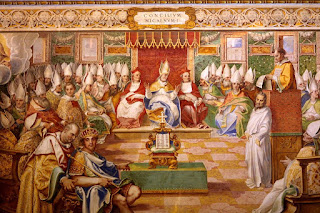It certainly is one thing to insist on Tradition over novelty but how do we arrive on what is Tradition and what is novelty? Can doctrine develop? If doctrine does develop, how can we tell what doctrines then to weed out? Under the banner of "doctrinal development" heretics have successfully imputed the errors of modernity into the Church in recent eras. Heretics prefer to insist that "doctrinal development" moves the Church under the guidance of the Holy Spirit. Cardinal Parolin, one of the current Pontiff's chief promulgators of heresy has even attacked orthodox Catholics for holding the orthodox position of the Church that Catholic doctrine can't change!
"Doctrinal development" is the recent mask that is used to flush into the Church the heresies so how can we weed out what is false doctrine and what is pernicious heresy in today's Church? We appeal once again to the rule established by St. Vincent of Lérins! He states, "the growth of religion in the soul must be analogous to the growth of the body" (Commonitory, ch.XXXIII, 55). Here begins the comparison of how doctrine is meant to develop. The body naturally grows from an infant into a youth and finally into an old man. But where does the body, in its development, ever add a third arm or cut out its own parts? Certainly a body can be wounded but that's not a natural development! We'd consider that a defect. It's not meant to grow like that. It's not supposed to grow with an amputated limb or an extra limb. The modern heretics nefariously conceive this as not only plausible growth but also as "natural development"!
St. Vincent continues with the analogy:
"In like manner, it behoves Christian doctrine to follow the same laws of progress, so as to be consolidated by years, enlarged by time, refined by age, and yet, withal, to continue uncorrupt and unadulterate, complete and perfect in all the measurement of its parts, and, so to speak, in all its proper members and senses, admitting no change, no waste of its distinctive property, no variation in its limits." (ibid, 56)
It remains for God's Church to cultivate what the Fathers have sown so that it may grow properly in the garden without being tossed around and mixed up with weeds and tares so that "[t]hey may receive proof, illustration, definiteness; but they must retain withal their completeness, their integrity, their characteristic properties" (57).
We must follow the whole of the Fathers and grow their doctrines. We hold that which has been taught consistently and by the majority of the Fathers. St. Vincent elaborates on what we now know as the doctrine of the consensus patrium, the true Magisterium of the Church and not the pernicious lie of whatever it is the earthly hierarchy holds at a given time!
"Whom yet are we to believe on this condition, that that only is to be accounted indubitable, certain, established, which either all, or the more part, have supported and confirmed manifestly, frequently, persistently, in one and the same sense, forming, as it were, a consentient council of doctors, all receiving, holding, handing on the same doctrine. But whatsoever a teacher holds, other than all, or contrary to all, be he holy and learned, be he a bishop, be he a Confessor, be he a martyr, let that be regarded as a private fancy of his own, and be separated from the authority of common, public, general persuasion, lest, after the sacrilegious custom of heretics and schismatics, rejecting the ancient truth of the universal Creed, we follow, at the utmost peril of our eternal salvation, the newly devised error of one man." (ch.XXVIII, 72)
The first principle we take away is that doctrine develops according to the natural laws of growth. It does not mutate, it does not change, but is cultivated and pruned in order that it remains what it was planted in order to become. The second principle is that the majority testimony of the saints and the Fathers of the Church has become the advisory council for the Church. This is the Magisterium. It's not a deviant catechism that's been published with the personal opinions of a Pope or a Bishop, it's not an encyclical standing out on its own, its the overall consensus of what has already been affirmed. The pastoral documents are non-dogmatic because the clergy throwing them out as of late know that they are deviations from Tradition. We are currently undergoing a test in the Church right now between the deviant heretics and the faithful orthodox. During this trial, the orthodox have been aggressively persecuted. If your brother is attempting to follow, to the best of his abilities, the ancient canons of the Church, even if it deviates from the obvious current positions of the pernicious authorities in the Church, do not dissuade nor harass him, exhort him to continue and join him in his efforts! Do not become among those on who will end up contributing to the reason he shall be declared "blessed" by Our Lord!

No comments:
Post a Comment